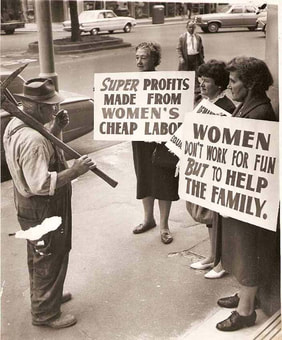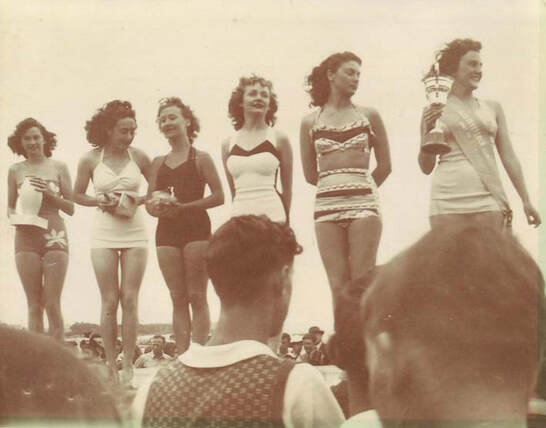 Agnes Doig takers her fight for fair pay to the city.
Agnes Doig takers her fight for fair pay to the city. By Christine Grayden.
IT IS undeniable that most written history in Australia has been about men. Much of this history has used male-generated official documents as source material, and been written by men. Since about the 1970s, coinciding with both the women’s liberation movement and a growing interest in the lives of women during the Great Depression, there has been something of an explosion of history dealing with women.
It has taken a while for this trend to filter down to local history writing, including here in Bass Coast. Since Women’s History Month is celebrated in March each year in Australia, the UK and the US, I thought it might be timely to let readers know where they can easily access some most interesting women’s history relating to Bass Coast.
IT IS undeniable that most written history in Australia has been about men. Much of this history has used male-generated official documents as source material, and been written by men. Since about the 1970s, coinciding with both the women’s liberation movement and a growing interest in the lives of women during the Great Depression, there has been something of an explosion of history dealing with women.
It has taken a while for this trend to filter down to local history writing, including here in Bass Coast. Since Women’s History Month is celebrated in March each year in Australia, the UK and the US, I thought it might be timely to let readers know where they can easily access some most interesting women’s history relating to Bass Coast.
You can read a lot about women in Bass Coast’s history simply by clicking on the links to our local historical society websites. Various articles have appeared in the Bass Coast Post and the Waterline News over the years, and on the website of the Phillip Island Conservation Society. You can even hop on the Sound Cloud website and listen to some Phillip Island women talking about history, or on YouTube to watch women talking about their experiences of World War Two on Phillip Island.
Without having to visit a venue or purchase or borrow a book, here are some readily available online resources to pique your curiosity:
The Wonthaggi and District Historical Society
The society’s newsletter, the Plod, has several essays about local women:
The Wonthaggi Society has a large and valuable archive resource of audio, video, documents and images. At this stage their catalogue is not digitised online.
Inverloch Historical Society
With an archive of over 10,000 photographs and postcards ahead of them with their digitising project, the Inverloch Society has already uploaded over 950 images on to the Victorian Collections website. Inverloch Historical Society will no doubt uncover a trove of images regarding the history of women in Inverloch during this project.
Meanwhile they do have some resources about Inverloch women’s history on their website, including this online book:
Without having to visit a venue or purchase or borrow a book, here are some readily available online resources to pique your curiosity:
The Wonthaggi and District Historical Society
The society’s newsletter, the Plod, has several essays about local women:
- There was a storm in her, by Carolyn Landon, about Agnes Doig.
- Ciconte Close, by Carolyn Landon with additions by Sam Gatto
- Clara's Story, by Geoff Johnson
The Wonthaggi Society has a large and valuable archive resource of audio, video, documents and images. At this stage their catalogue is not digitised online.
Inverloch Historical Society
With an archive of over 10,000 photographs and postcards ahead of them with their digitising project, the Inverloch Society has already uploaded over 950 images on to the Victorian Collections website. Inverloch Historical Society will no doubt uncover a trove of images regarding the history of women in Inverloch during this project.
Meanwhile they do have some resources about Inverloch women’s history on their website, including this online book:
- Inverloch: a patchwork of historical stories by Mrs E P Brewster. Typically the women are anonymous, referred to as “his wife” or, in one instance, Mary Mountain who later became ‘Mrs. Bill Ramsay’.
- Inverloch: Scotland & Pommy Land – the Wonthaggi Connection includes Nancy’s Story by Angela Stirton, an abridged version, 1944, and Inverloch: 1940s & 1950s, based on an address given to the Inverloch Historical Society in 1998 by Ruth Glare (nee Hamilton)
- Anderson Inlet Inverloch – Murder in Inverloch – The Sodeman Murders The murder of Ethel Belshaw told by Bob Sartain
- Miss Inverloch 1960 strikes problems. Newspaper reports on Miss Inverloch competitions 1956 and 1960.
Phillip Island and District Historical Society
The society has various essays, talks and transcripts of interviews about and with women:
Phillip Island Conservation Society
Their website contains freely available PDFs of a number of their publications including the books Women in Conservation on Phillip Island (edited by Christine Grayden), and An Island Worth Conserving, by Christine Grayden, which cover many aspects of women’s roles in environmental activism on Phillip Island.
Bass Coast Post
There is no doubt that editor Catherine Watson has worked hard to ensure gender balance on this website.
The Post’s local history section includes some women’s history.
Bass Coast has embraced the LGBQTI+ community, especially in the last 10 years, and this is reflected in some of the essays about and by significant local women in this movement. For example,
The Waterline News
Although the Bass Valley Historical Society has removed its website, editor Geoff Ellis continues the policy of the previous editor and publishes various historical items relating to the Bass Valley area, including regarding women. During March for the past few years he has included International Women’s Day articles which are valuable records of women’s views of both historical and contemporary events and issues:
Future online content about local women’s history?
There is certainly potential for other Bass Coast organisations and businesses to make more local women’s history available online for the world to see. Such groups could include: The National Vietnam Veterans Museum, the surfing and surf lifesaving clubs, Phillip Island Grand Prix circuit, Bass Coast Health, Country Women’s Association branches, and many others.
Let us hope we can redress the gender imbalance that has existed since colonisation in our telling of our history. Not just in March for Women’s History Month, but in every historical narrative and investigation undertaken about Bass Coast.
The society has various essays, talks and transcripts of interviews about and with women:
- Recordings of several women speaking about Phillip Island historical topics can be listened to at https://soundcloud.com/pidhs These were recorded during 2015 at the Inverloch Studios of 3MFM as part of a Phillip Island oral history series they broadcast, which later won a Museums Australia Victoria state award.
- Interviews videoed in 1995 with various local women about their experiences on Phillip Island during World War Two can be viewed on the society’s YouTube channel: Challenges and fears at home.
- This society has catalogued over 3000 images relating to Phillip Island on to Victorian Collections. Many of these feature women.
- The late June Cutter’s book Guest Houses on Phillip Island – which features many stories about strong and resourceful women who ran those guesthouses or worked in them or stayed in them – is gradually being digitised onto the essays and talks section of this society’s website with the kind permission of June’s family.
- Undertaking another oral history project over the past two years, the Phillip Island group engaged local oral historian Dr Andrea Cleland to record the experiences of a number of women (and men) over the past 60 years on Phillip Island. The transcripts or essays from the transcripts can be read on the society’s essays and talks section. They contain many wonderful stories and insights by the women interviewed.
Phillip Island Conservation Society
Their website contains freely available PDFs of a number of their publications including the books Women in Conservation on Phillip Island (edited by Christine Grayden), and An Island Worth Conserving, by Christine Grayden, which cover many aspects of women’s roles in environmental activism on Phillip Island.
Bass Coast Post
There is no doubt that editor Catherine Watson has worked hard to ensure gender balance on this website.
- Bass Coast Prize for Non-Fiction has a full list of prize winners and highly commended entries from 2019-21.
- Although not Bass Coast but set in the High Country – second prize in the Bass Coast Prize for Non-Fiction in 2021 went to The Snow Girls, by Graham Wheeler, a wonderful factual story of two young women who survived a week in bleak conditions in the 1950s.
- My own memoir story Jobs that no longer exist, which won the 2019 prize, describes some of the hard physical labour that rural women have undertaken in Bass Coast in the past, which has not really been acknowledged before.
The Post’s local history section includes some women’s history.
Bass Coast has embraced the LGBQTI+ community, especially in the last 10 years, and this is reflected in some of the essays about and by significant local women in this movement. For example,
- ‘I have nothing to hide’ by Catherine Watson about Francesca Curtis, an activist for gay rights in the 1970s.
- Somewhere over the rainbow by Phyllis Papps.
- Phyllis also wrote The leading lady about the amazing life and career of Stella Axarlis,
- Our island home by Anne Davie is about local writer Linda Cuttriss and 500 Million Years on Phillip Island, the book she wrote with Dr Eric Bird, and recently revised.
- Catherine Watson also wrote a fascinating series of “Covid diaries”, which cover a lot of history of the pandemic from her experience and point of view.
The Waterline News
Although the Bass Valley Historical Society has removed its website, editor Geoff Ellis continues the policy of the previous editor and publishes various historical items relating to the Bass Valley area, including regarding women. During March for the past few years he has included International Women’s Day articles which are valuable records of women’s views of both historical and contemporary events and issues:
Future online content about local women’s history?
There is certainly potential for other Bass Coast organisations and businesses to make more local women’s history available online for the world to see. Such groups could include: The National Vietnam Veterans Museum, the surfing and surf lifesaving clubs, Phillip Island Grand Prix circuit, Bass Coast Health, Country Women’s Association branches, and many others.
Let us hope we can redress the gender imbalance that has existed since colonisation in our telling of our history. Not just in March for Women’s History Month, but in every historical narrative and investigation undertaken about Bass Coast.
